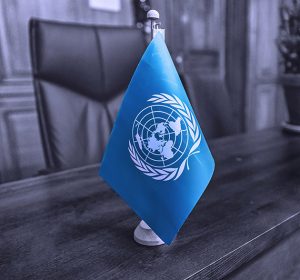

As the world becomes more interconnected, language plays a crucial role in bridging cultural and linguistic gaps. The United Nations, being an international organization, is comprised by member states from all around the world. As such, the organization has to rely on multiple languages to facilitate communication and ensure that every member state can participate in discussions.
Firstly, let's start with a bit of history. The UN was established in 1945 with the aim of promoting international cooperation and peace. Since then, it has grown into a major global organization with 193 member states.
One of the most important aspects of the UN is its role as a forum for international diplomacy. Representatives from member states meet to discuss and negotiate on a wide range of issues, from global health to climate change to human rights. But you might have been wondering:
How many languages are spoken at the United Nations?
There are six official languages of the United Nations. These include Arabic, Chinese, English, French, Russian, and Spanish. These official languages of the UN are enshrined in the UN Charter, which was signed in San Francisco on June 26, 1945. These six languages were designated in recognition of their widespread usage and political significance at the time.
Each of these languages is used in different ways at the UN. For example, English and French are the languages of the UN Secretariat, which is responsible for carrying out the day-to-day work of the organization. Chinese, Russian, and Spanish are used in some of the UN's specialized agencies, such as the International Atomic Energy Agency and the International Labor Organization. Arabic is used in the UN's work in the Middle East and North Africa. This means that all documents and official communications of the organization are translated into all six languages.
The choice of the six official languages of the United Nations is not arbitrary but rather a reflection of the political landscape at the time of the organization's formation. As the world has changed, so have the linguistic needs of the United Nations. In response to this, the organization has expanded its linguistic services to include other languages such as Portuguese and Swahili.
In addition to the official languages, Interpretation services are provided by the UN's Department of Global Communications (DGC). The DGC's Interpretation Service provides simultaneous interpretation for all official UN meetings, as well as other events such as press conferences, briefings, and interviews. The service uses state-of-the-art technology to provide accurate and timely interpretation in multiple languages.
To ensure high-quality interpretation, the UN has established strict criteria for interpreters. These include a high level of proficiency in their working languages and a thorough understanding of the subject matter. They must also have strong communication skills, including the ability to listen, concentrate, and speak clearly and fluently.
This is the reason why the UN has a Language and Communications Program, which provides language training for its staff members. The program offers courses in the official languages of the UN, as well as other languages such as Portuguese, Swahili, and Urdu. The program helps staff members to improve their language skills and promote the use of multilingualism within the UN.
Multilingualism is an important aspect of the UN's work, as it promotes understanding, cooperation, and inclusion. By recognizing and promoting the diversity of languages and cultures, the UN helps to create a more peaceful and harmonious world. According to the former UN Secretary-General Kofi Annan, "We may have different religions, different languages, different colored skin, but we all belong to one human race."
But you may ask "Why the use of multiple languages?" Well, the use of multiple languages at the United Nations is essential in promoting inclusion, diversity, and understanding among member states. The UN recognizes that language is an essential part of cultural identity, and the use of multiple languages helps to ensure that all member states feel valued and respected.
The United Nations is an organization that values linguistic diversity and recognizes the importance of language in promoting mutual understanding and cooperation. The use of multiple languages ensures that all member states can fully participate in discussions and contribute to the global conversation.
At The Spanish Group, we provide top-notch translation services in a variety of languages, encompassing all official United Nations languages and numerous other languages from around the globe. Our team of expert translators possesses extensive knowledge and experience in delivering precise translations that cater to each client's unique requirements. Be it legal, technical, medical, or business translation, The Spanish Group has the necessary expertise and resources to meet your expectations.
Contact us today to discover more about our translation services and how we can assist you in accomplishing your language objectives.
















